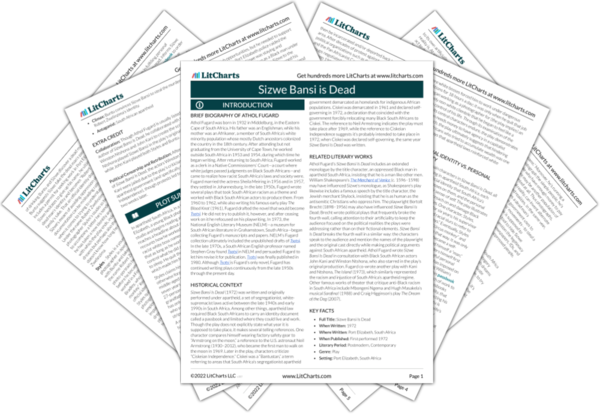Sizwe Bansi Is Dead, a play set in apartheid South Africa, illustrates how wealth gives individuals agency in capitalist societies. South Africa’s apartheid laws enforced a racist social hierarchy by not only restricting Black South Africans’ legal rights but also preventing them from accumulating wealth, which would allow them more agency and ability to help one another. The play’s title character, Sizwe Bansi, leaves his rural home in King William’s Town because he can find no employment opportunities there but wants to support his family. When he travels to the urban area of Port Elizabeth, however, he discovers that he lacks the permits that South Africa’s white-run bureaucracy legally requires of a Black man who wants to live and work in a new place. By restricting where Sizwe can work, apartheid law prevents him from earning money and deprives him of the ability to support his family. The play’s other main characters, Buntu and Styles, have also suffered economic hardship and compromised agency due to apartheid’s racist hierarchies. For instance, the (presumptively white) people who employ Buntu’s wife as a live-in maid only allow her to return home on weekends. Buntu’s child lives with Buntu’s mother; it’s implied that Buntu and his wife work too much to look after the child. This situation shows how Buntu’s family can’t choose to stay together because they lack the wealth that could allow them to do so. Meanwhile, Styles used to work in an automobile factory where white bosses forced him to work under dangerous conditions for 18 hours a day; it was only when he quit that job and began working as a photographer for (the play implies) an exclusively non-white clientele that he began to feel like a person in control of his life. Through its examination of the hardships its central characters endure, the play demonstrates that a person needs money to have agency in a capitalist society; as such, the play ultimately suggests that hindering Black South Africans who tried to accumulate wealth was one of the central ways that apartheid laws reinforced white supremacy.
Racial Hierarchies and Wealth Inequality ThemeTracker

Racial Hierarchies and Wealth Inequality Quotes in Sizwe Bansi Is Dead
STYLES: I worked at Ford one time. We used to read in the newspaper . . . big headlines! . . . ‘So and so from America made a big speech: “. . . going to see to it that the conditions of their non-white workers in Southern Africa were substantially improved.”’ The talk ended in the bloody newspaper. Never in the pay packet.
STYLES: That was my moment, man. Kneeling there on the floor . . . foreman, general foreman, plant supervisor, plant manager . . . and Styles? Standing!
STYLES: ‘Gentlemen, he says that when the door opens and his grandmother walks in you must see to it that you are wearing a mask of smiles. Hide your true feelings, brothers. You must sing. The joyous songs of the days of old before we had fools like this one next to me to worry about.’ [To Bradley.] ‘Yes, sir!’
STYLES: I took a good look at my life. What did I see? A bloody circus monkey! Selling most of his time on earth to another man. Out of every twenty-four hours I could only properly call mine the six when I was sleeping. What the hell is the use of that?
STYLES: You must understand one thing. We own nothing except ourselves. This world and its laws, allows us nothing, except ourselves. There is nothing we can leave behind when we die, except the memory of ourselves.
STYLES: Here he is. My father. That’s him. Fought in the war. Second World War. Fought at Tobruk. In Egypt. He fought in France so that this country and all the others could stay Free. When he came back they stripped him at the docks—his gun, his uniform, the dignity they’d allowed him for a few mad years because the world needed men to fight and be ready to sacrifice themselves for something called Freedom […] When he died, in a rotten old suitcase amongst some of his old rags, I found that photograph. That’s all. That’s all I have from him.
STYLES: Always helping people. If that man was white they’d call him a liberal.
MAN: I don’t want to leave Port Elizabeth.
BUNTU: Maybe. But if that book says go, you go.
MAN: Can’t I maybe burn this book and get a new one?
BUNTU: Burn that book? Stop kidding yourself, Sizwe! Anyway, suppose you do. You must immediately go apply for a new one. Right? And until that new one comes, be careful the police don’t stop you and ask for your book. Into the Courtroom, brother. Charge: Failing to produce Reference Book on demand. Five rand or five days.
BUNTU: I’m also married. One child.
MAN: Only one?
BUNTU: Ja, my wife attends this Birth Control Clinic rubbish. The child is staying with my mother.
BUNTU: That’s it, brother. The only time we’ll find peace is when they dig a hole for us and press our face into the earth.
BUNTU: It’s your only chance!
MAN: No, Buntu! What’s it mean? That me, Sizwe Bansi . . .
BUNTU: Is dead.
MAN: I’m not dead, friend.
BUNTU: We burn this book . . . [Sizwe’s original] . . . and Sizwe Bansi disappears off the face of the earth.
BUNTU [angry]. All right! Robert, John, Athol, Winston . . . Shit on names, man! To hell with them if in exchange you can get a piece of bread for your stomach and a blanket in winter.
MAN: A black man stay out of trouble? Impossible, Buntu. Our skin is trouble.
















